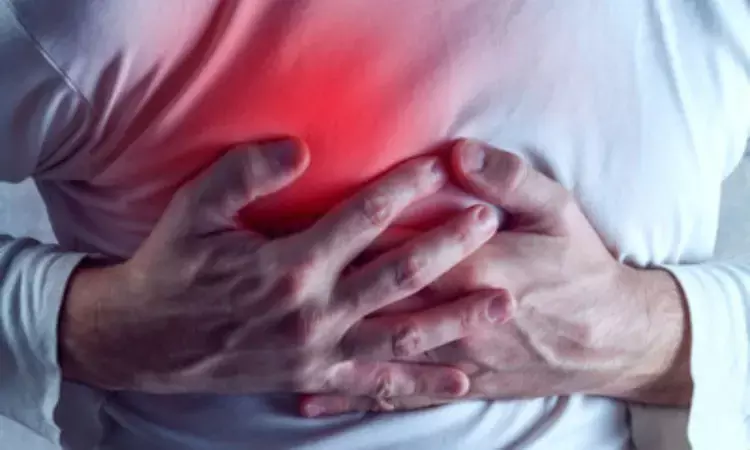- Home
- Medical news & Guidelines
- Anesthesiology
- Cardiology and CTVS
- Critical Care
- Dentistry
- Dermatology
- Diabetes and Endocrinology
- ENT
- Gastroenterology
- Medicine
- Nephrology
- Neurology
- Obstretics-Gynaecology
- Oncology
- Ophthalmology
- Orthopaedics
- Pediatrics-Neonatology
- Psychiatry
- Pulmonology
- Radiology
- Surgery
- Urology
- Laboratory Medicine
- Diet
- Nursing
- Paramedical
- Physiotherapy
- Health news
- Fact Check
- Bone Health Fact Check
- Brain Health Fact Check
- Cancer Related Fact Check
- Child Care Fact Check
- Dental and oral health fact check
- Diabetes and metabolic health fact check
- Diet and Nutrition Fact Check
- Eye and ENT Care Fact Check
- Fitness fact check
- Gut health fact check
- Heart health fact check
- Kidney health fact check
- Medical education fact check
- Men's health fact check
- Respiratory fact check
- Skin and hair care fact check
- Vaccine and Immunization fact check
- Women's health fact check
- AYUSH
- State News
- Andaman and Nicobar Islands
- Andhra Pradesh
- Arunachal Pradesh
- Assam
- Bihar
- Chandigarh
- Chattisgarh
- Dadra and Nagar Haveli
- Daman and Diu
- Delhi
- Goa
- Gujarat
- Haryana
- Himachal Pradesh
- Jammu & Kashmir
- Jharkhand
- Karnataka
- Kerala
- Ladakh
- Lakshadweep
- Madhya Pradesh
- Maharashtra
- Manipur
- Meghalaya
- Mizoram
- Nagaland
- Odisha
- Puducherry
- Punjab
- Rajasthan
- Sikkim
- Tamil Nadu
- Telangana
- Tripura
- Uttar Pradesh
- Uttrakhand
- West Bengal
- Medical Education
- Industry
PET/CT imaging reveals risk of major adverse cardiovascular events in pneumonia patients: Study

Canada: FDG-PET/CT scans have revealed that vascular inflammation may trigger high rates of adverse events and heart attacks in pneumonia patients, says a study published in JACC: Cardiovascular Imaging. The findings imply a mechanistic link between vascular inflammation and MACE (major adverse cardiovascular events).
Patients with CAP (community-acquired pneumonia) are reported to be at increased risk of MACE, and this risk remains increased for months to years after the resolution of the infection. As measured by F-18 FDG PET/CT scans, vascular inflammation in the aortic walls is associated strongly with the MACE risk. Thus, a plausible mechanism for the elevated risk of MACE in CAP survivors is the increased vascular inflammatory activity post-community-acquired pneumonia. Despite this, any putative changes in vascular inflammatory activity after CAP have not been investigated.
Against the above background, Vicente Corrales-Medina from the University of Ottawa in Ontario, Canada, and colleagues examined F-18 FDG scans in patients before and after their recovery from community-acquired pneumonia (CAP). They found that a higher aortic inflammation observed on the scans could indicate poor outcomes in these patients.
For this purpose, the researchers enrolled 25 consecutive community-dwelling adults aged 65 years or older admitted to the Ottawa Hospital in Ontario between 2015 to 2018 with symptoms consistent with pneumonia but of less than two weeks duration. Study participants underwent F-18 FDG-PET/CT scans to detect aortic inflammation within the first 72 hours of hospitalization and again 30 to 45 days after discharge.
The study led to the following findings:
- Aortic inflammation in pneumonia patients was significantly higher during the first 72 hours than after the patients recovered (maximum tissue-to-background ratio: 2.56 vs. 2.09).
- Compared with 28 patients without pneumonia who had undergone FDG-PET/CT scans for suspected cancer (but who ultimately received a benign diagnosis), aortic inflammation in patients both during CAP and after recovery was also significantly higher.
- F-18 FDG-PET/CT has independent and incremental prognostic value in predicting MACE, and the temporal pattern of F-18 FDG-PET/CT changes after CAP was seen in the study correlated well with the trajectory of MACE risk in CAP survivors.
The authors noted that this was the first study to examine aortic F-18 FDG-PET/CT in CAP patients, and additional studies are warranted.
"Our results suggest a mechanistic link between vascular inflammation and MACE after CAP that needs further investigation," the team concluded.
Reference:
The study, "Vascular Inflammation During and After Community-Acquired Pneumonia as Measured by 18F-FDG-PET/CT Imaging," was published in JACC: Cardiovascular Imaging.
DOI: https://doi.org/10.1016/j.jcmg.2022.10.003
Dr Kamal Kant Kohli-MBBS, DTCD- a chest specialist with more than 30 years of practice and a flair for writing clinical articles, Dr Kamal Kant Kohli joined Medical Dialogues as a Chief Editor of Medical News. Besides writing articles, as an editor, he proofreads and verifies all the medical content published on Medical Dialogues including those coming from journals, studies,medical conferences,guidelines etc. Email: drkohli@medicaldialogues.in. Contact no. 011-43720751


